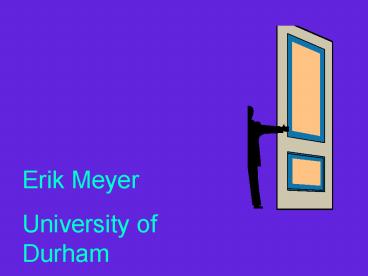Erik Meyer - PowerPoint PPT Presentation
1 / 26
Title:
Erik Meyer
Description:
that lead to a previously inaccessible way of thinking about something ... limen: threshold... liminality: variation in the threshold state' opportunity cost ... – PowerPoint PPT presentation
Number of Views:71
Avg rating:3.0/5.0
Title: Erik Meyer
1
Erik Meyer University of Durham
2
Threshold concepts
3
The idea
In some disciplines
4
there are
conceptual gateways or portals
5
that lead to a previously inaccessible way of
thinking about something
6
a new way of understanding, interpreting or
viewing something, without which the learner
cannot progressa transformed internal view of
subject matter, subject landscape, or even world
view
7
that may be troublesome (after Perkins, 1999)
counter-intuitive, alien, come from another
culture.
8
In addition to being transformative gateways, and
possibly troublesome, threshold concepts may be
irreversible integrative bounded
9
Consider for example variation in student learning
10
opportunity cost
the cost of the next best, but rejected,
alternative
11
When the dust settles, most students leave the
introductory course never having fully grasped
the essence of microeconomics. Thus the
opportunity cost concept, so utterly central to
our understanding of what it means to think like
an economist, is but one among hundreds of other
concepts that go by in a blur. (Frank, 1998, p14.)
12
By think like an economist I mean not just to
be able to apply the core principles to
observations and experience, but also to have an
inclination to do so. (Frank, 1998, p15.)
13
What can you tell me about how economists
think...versuscan you think like an economist?
14
Siegfried and Sanderson (1998) in discussing the
use of sports to teach economics suggest that,
from a student learning perspective, the creation
of (counterintuitive) troublesome knowledge can
be a good thing such knowledge can assist
students to appreciate the importance of some
economic phenomena and, in so doing, foreground
in this case how economists think
15
Although the existence of multiple equilibria is
probably the most disconcerting characteristic of
games for veteran economists, the absence of
counterintuitive results often creates a mental
obstacle for the rookie student. Because of their
experience with sports, many students believe
that they know how to play the game. Producing
counterintuitive results in this context is
persuasive evidence that there is something
useful to learn from a serious study of
economics. A simple exercise with a mixed
strategy equilibrium game demonstrates the
importance of taking indirect effects into
account, which is a key element of thinking like
an economist. (p. 167)
16
depreciation in accounting
the allocation of cost
17
Threshold concepts provide us with a new lens to
focus on critical, and perhaps previously
neglected, aspects of
variation in student learning
18
that can provide a micro perspective on quality,
especially in terms of constructive alignment
19
and the evaluative component of variation in
student learning engagement
20
FDTL 5 initiative GBP 7m across 11 subject
areasincluding economics Phase 1 LTSN,
institutional support required
21
FDTL 5 initiative Consortium bid by four
universities c. GBP 250000
Develop effective ways of embedding threshold
concepts in economics
22
opportunity cost
price and value
equilibrium
gains from trade
limen threshold
liminality variation in the threshold state
23
preliminal variation how do students approach
the learning engagement of
24
opportunity cost
price and value
Can we find a proxy for
equilibrium
gains from trade
externalities
cumulative causation
25
ecologically valid authentic examples
instrumentation
location and structural variation (preliminal and
liminal)
26
References
Biggs, J. (1999). Teaching for quality learning
at university. SRHE and OU Press, Buckingham.
Frank, R.H. (1998). Some thoughts on the micro
principles course. In W.B. Walstad P. Saunders
(Eds.), Teaching Undergraduate Economics A
handbook for instructors. Irwin/McGraw-Hill,
Boston.
Meyer, J.H.F. Land, R. (2003). Threshold
concepts and troublesome knowledge (1) linkages
to thinking and practising within the
disciplines. In C. Rust (Ed.), Improving Student
Learning ten years on, OCSLD, Oxford.
Perkins, D. (1999). The many faces of
constructivism. Educational Leadership, 57, (3),
6-11.
Siegfried, J.J. Sanderson, A.R. (1998). Using
sports to teach economics. In W.E. Becker M.
Watts (Eds.), Teaching economics to
undergraduates. Alternatives to chalk and talk.
Edward Elgar, Cheltenham.































